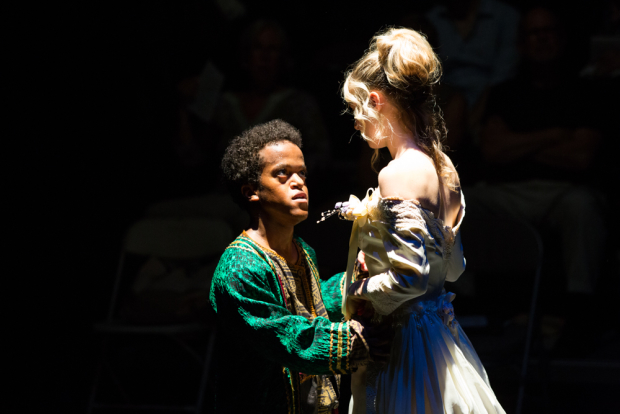Las Meninas

(© Annabel Clark)
Las Meninas, a work of historical fiction by Pulitzer Prize winner Lynn Nottage, made its world premiere at San Jose Repertory Theatre in 2002, and all but disappeared in the years since. The New Brooklyn Theatre now picks up the play for its New York premiere at the Irondale Center, where audiences are generously given free access to the renowned playwright's lesser-known piece. A tragic love story is tied to an intriguing footnote in European history as an illegitimate half-African child by Queen Marie-Therese of France is spun from conjecture into reality. But the play itself, laden with dense dialogue and a stylized comic sensibility, proves too much for the company to maneuver.
Set during the reign of Louis XIV, Las Meninas takes us to a farce-tinted version of 17th-century France where a pathetic Sun King (played a little too un-kingly by Arnaud Spanos) dons a foolish head of black curls and a court of giggling maidens dress in uniform white gowns with bright orange accents. Aside from Becky Rosefelt's apropos costuming and Paul Hudson's dramatic lighting , Jonathan Solari's direction does nothing to accentuate the theatrical levity that Nottage blends into her thick period prose. The air in the room is heavy from the start as a dark story grows ever darker amongst Courtney Nelson's abstract set of scaffolding (two separate towers that flank the vacuous space). Jokes fly by unnoticed as they are delivered in the same tone as the play's most earnest speeches — neither holding our attention to a story that should be captivating.
Toni Ann DeNoble offers one of the strongest performances as Louise Marie-Therese, our narrator and conjurer of events past who stares down her audience as she intimately shares her story. Like Tom Wingfield in The Glass Menagerie, she recollects a history, though one she never experienced. Holed up in a convent and secluded from the outside world, she is the presumed daughter of Queen Marie-Therese (Samantha Levitt) and the queen's jester Nabo Sensugali (Rance Nix), an African dwarf sent from the kingdom of Dahomey to France in a box as a gift to the royal family. Louise imagines the circumstances behind her mysterious birth, including the details of her parents' unconventional relationship.
The scenario leaves room for fascinating supposition. After all, how does an African dwarf manage to woo the Queen of France? Nottage provides a convincing answer, pegging both as outsiders far from their native lands — she, hailing from Spain, and he, dragged from his home in Africa. Levitt and Nix, who portray these star-crossed lovers, however, harness none of the magnetic bond that draws together these two unlikely souls (nor does Nix display the charisma of the king's most amusing jester). When the pair is torn apart — as the day's social mores make a foregone conclusion — what should be a devastating and morally unsettling blow leaves us cold. Louise is the only character who elicits sympathy, as she suffers the ostracism of her subservient race and scandalous birth. Her ethereal presence also offers an air of mystery that the play's title — taken from a famously enigmatic Velázquez painting — promises us from the start. Unfortunately, it's when our imaginations are asked to leap beyond the convent walls and journey into the inscrutable past that the mystique is lost.











